Mark David Gerson's Blog, page 3
January 22, 2016
Finally, a Home for My Book Excerpts!
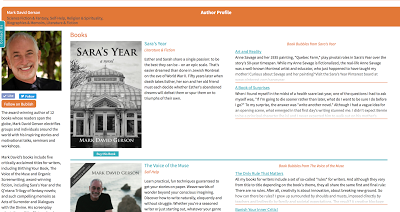 Two years ago when I streamlined my website, the first pages to go were those featuring excerpts from my books. It had been simple, with only one or two books, to include excerpts on my site. But as the number of my published titles swelled from two to four to ten, those excerpt pages were threatening to take over the website!
Two years ago when I streamlined my website, the first pages to go were those featuring excerpts from my books. It had been simple, with only one or two books, to include excerpts on my site. But as the number of my published titles swelled from two to four to ten, those excerpt pages were threatening to take over the website!Then I discovered Bublish, and it was as though the service had been created just for me: It was a centralized way for me to share not only excerpts from all my books with potential readers, but also short personal essays (or "author insights," as Bublish calls them) about those excerpts. On top of that, visitors to my Bublish pages could easily navigate back to my website, as well as to my books at their favorite online bookstores.
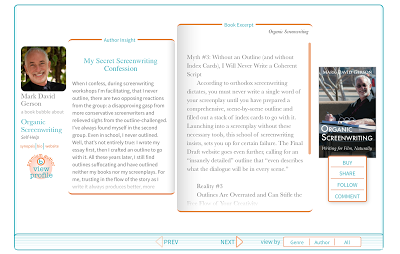
I was hooked. Even before my free trial was over, I signed up for the full service. Now, seven months later, my excerpts (or "book bubbles," as they're called on Bublish) have been viewed nearly 20,000 times, and more than 10% of those views have translated into online bookstore visits. As an indie author, that's terrific. And for readers wanting to get a risk-free taste of my titles, it's even more terrific.
If you haven't visited me on Bublish, please do at https://www.bublish.com/author/view/5354, where you'll find two or more compelling excerpts from each of my titles and, coming soon, excerpts from After Sara's Year, my new novel-in-progress, a sequel to Sara's Year .
Published on January 22, 2016 10:11
January 13, 2016
Destination Unknown: The Magic of the Open Road
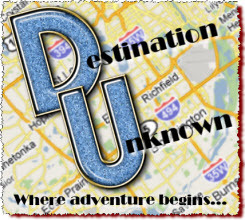 In the following exchange with a fellow screenwriter on Facebook, I spell out why I believe that control is anathema to the creative process – in both writing and life.
In the following exchange with a fellow screenwriter on Facebook, I spell out why I believe that control is anathema to the creative process – in both writing and life. It's ironic that my Facebook colleague chooses to use the "unmapped drive" example to criticize what he terms the wastefulness of unplanned writing. Going for a random, unplanned drive is the example I always use in my workshops and coaching sessions to celebrate the magic of discovery. It's also the basis for what I call "writing on the Muse Stream," which I explore in Organic Screenwriting: Writing for Film, Naturally and all my books for writers.
Other Writer: The problem I think a lot of screenwriters have is not being able to nail down exactly what your ending is before starting. That would be like getting in the car for a weekend getaway and not having any idea where it is you're going... just driving... aimlessly, wasting a whole hell of a lot of gas. This is where the idea of mapping comes in... if you know where you're going, you'll get there, and usually in the most direct line.
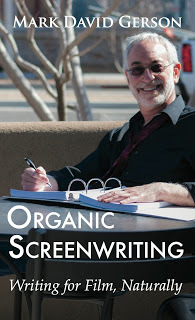 MDG: I'm glad you used the analogy of going for a drive without a fixed destination in mind because that's precisely how I like to go for drives. It's much more fun to get in the car, start it up and see where it will take me. Nearly always, it takes me to a place I never could have imagined going, along a route I never would have thought of taking.
MDG: I'm glad you used the analogy of going for a drive without a fixed destination in mind because that's precisely how I like to go for drives. It's much more fun to get in the car, start it up and see where it will take me. Nearly always, it takes me to a place I never could have imagined going, along a route I never would have thought of taking.As it turns out, it's also how I write and live my life. It can be scary sometimes. It can certainly feel out of control. But those are the places where magic resides and miracles thrive. And what's life and creativity if not a magical, miraculous journey of wonder and surprise?
To go back to your "out for a drive" analogy: When I write, I sit in the passenger seat of the experience; the story is in the driver's seat. The story is in the driver's seat because it's its own entity, if you will, one that knows its direction and imperative far better than I ever could. And if I let it take charge, it will introduce me to characters and situations my controlling mind would never have thought up.
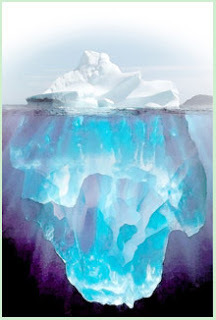 As for my life, if I had set a fixed destination and mapped out the journey, I would never have written 12 books and a trio of optioned screenplays (in fact, it's unlikely I ever would have been a writer), I would not likely be living in the U.S. (I'm Canadian), and I doubt that I would be a parent...just to name three pretty amazing life-altering experiences.
As for my life, if I had set a fixed destination and mapped out the journey, I would never have written 12 books and a trio of optioned screenplays (in fact, it's unlikely I ever would have been a writer), I would not likely be living in the U.S. (I'm Canadian), and I doubt that I would be a parent...just to name three pretty amazing life-altering experiences.Just like the greatest bulk of an iceberg, my deepest desires and greatest stories often lie largely hidden in the ocean of my unconscious mind. The only way I know to access them is through those leaps of faith that keep my controlling mind out of the process.
In the end, my directions in writing and life are neither aimless nor energy-wasting. Rather, they're guided by a wiser part of myself that knows the destination and the way to reach it far better than the limits of my conscious mind ever could, as powerful and wonderful as that conscious mind is. That guidance is the best GPS there is.
Published on January 13, 2016 02:33
January 1, 2016
Mark David Gerson: A Writer's Life Revisited
 This is an updated version of an interview that originally appeared on Jean Vallesteros's Book Nerd blog a few years ago. Read the original and related material here.
This is an updated version of an interview that originally appeared on Jean Vallesteros's Book Nerd blog a few years ago. Read the original and related material here. Book Nerd: What inspired you to pen your first novel? Where did you get your ideas for The MoonQuest?
Mark David Gerson: I have written about the birth of The MoonQuest in my Acts of Surrender memoir. In short, though, I had no plans to write a MoonQuest, nor did I have a conscious desire to write a fantasy novel, let alone a trilogy. The MoonQuest birthed itself during a Toronto writing workshop I was facilitating when, in an unprecedented in-the-moment inspiration, I did the same exercise I had presented to participants. What I wrote that evening became the opening scene of the first draft of a novel I knew nothing about. From there, I just kept writing, discovering the story as I went along, until I was done. The StarQuest and SunQuest stories emerged similarly.
BN: What tools do you feel are must-haves for writers?
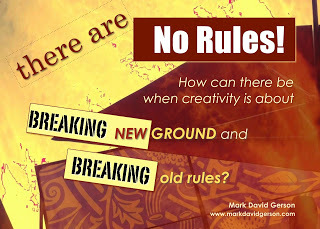 MDG: An open heart and mind and a willingness to surrender to your story and travel wherever it takes you (and to break all the rules getting there).
MDG: An open heart and mind and a willingness to surrender to your story and travel wherever it takes you (and to break all the rules getting there).BN: How long have you been writing?
MDG: Perhaps the better question would be, "How long did I resist writing?" I often joke that my Muse tricked me into writing, given that for most of my early life, I resisted anything remotely creative. My first jobs out of university were in public relations, where I had to write, even if what I wrote at first was largely formulaic. However, that experience gave me the confidence to try my hand at freelance work and, before I knew it, I was a full-time (self-taught) freelance writer and editor, doing mostly magazine, newspaper, corporate and government work. However, it wasn’t until my early 30s, when the double-whammy of a creative and spiritual awakening knocked me over the head that I began to explore more creative avenues. And it wasn’t until I was 39 that The MoonQuest, my first foray into serious creative writing, began to have its way with me. I’ve been hooked ever since.
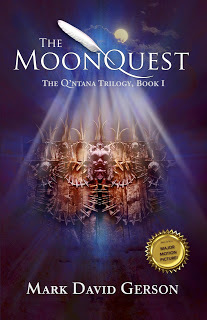 BN: What is The MoonQuest about?
BN: What is The MoonQuest about?MDG: Imagine a land where storytelling is banned, where storytellers have been put to death, where dreams and visions are outlawed, where imagination has been stripped from the land and its people. This is the Q’ntana of The MoonQuest, a land where, as Toshar, the main character, puts it, "'once upon a time' is a forbidden phrase and fact is the only legal tender." In this land, legend has it, the moon has been so saddened by the silence and tyranny that she has cried tears that have extinguished her light. As a result, the moon has not been seen for many generations. The MoonQuest, then, is the journey undertaken by a reluctant Toshar and his three companions to restore story and vision to the land and to rekindle the light of the moon. Check out the book trailer on YouTube.
BN: Is there anything you find particularly challenging in your writing? Did you learn anything from writing The MoonQuest and what was it?
MDG: When I begin a project, I rarely know the story in advance. When I began The MoonQuest, for example, I knew nothing about it, except what emerged in each day’s writing. I didn’t have a title until about halfway through and I had no idea of the ending until about two-thirds of the way through. It was an experience in surrender: in surrendering unconditional control to my Muse and to the story. And it was tough! It was tough to keep writing with no plot, no outline and not even the remotest clue where the story was taking me. But it taught me how to get out of the way and let the story have its way with me. That’s still how I write — regardless of the form, genre or project. I now do it with much less resistance than I did it on The MoonQuest. But it’s still, sometimes, the most challenging aspect of the work...even as it’s also the most exhilarating and is, for me, the key to the magic!
BN: If you had to choose, which writer would you consider a mentor?
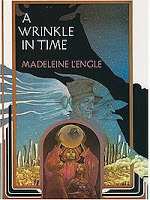 MDG: I’d probably have to say Madeleine L’Engle, author of A Wrinkle in Time. I didn’t discover A Wrinkle in Time and its sequels until I was an adult, when I also discovered, through her nonfiction writings, L’Engle’s deep spirituality, one that informed her creativity and her life. While L’Engle’s spirituality found its expression through the Episcopal Church and mine is largely unstructured, she was a profound influence on my writing and my life. In a sense, she already was a mentor without me knowing it. Now, if she were still alive, I’d like to thank her for that.
MDG: I’d probably have to say Madeleine L’Engle, author of A Wrinkle in Time. I didn’t discover A Wrinkle in Time and its sequels until I was an adult, when I also discovered, through her nonfiction writings, L’Engle’s deep spirituality, one that informed her creativity and her life. While L’Engle’s spirituality found its expression through the Episcopal Church and mine is largely unstructured, she was a profound influence on my writing and my life. In a sense, she already was a mentor without me knowing it. Now, if she were still alive, I’d like to thank her for that.BN: What is your work schedule like when you're writing?
MDG: For the most part, I don’t believe in fixed routines. Rather, I operate intuitively — in my writing and in my life. I’m not one of those people who writes at the same time every day or who believes that you should sit down to write regardless of how you feel. While other coaches and instructors recommend applying a regular routine to creative production, that method never works for me for very long. Rather, I remain as in-the-moment as I can and follow wherever the inspiration leads me — in my life as well as in my writing. That way of living and writing is both exhilarating and, at times, terrifying. But it does keep things in an organic balance!
BN: What was one of the most surprising things you learned in creating The MoonQuest?
MDG: Three things, I suppose. The first was that I was actually creative. The second, that the methods I had been teaching (what I call "writing on the Muse Stream": writing nonstop, without thinking, without worrying about where the story was going) actually worked on something as long as a novel. And the third, related to the second, that the story was, truly, way smarter than I was!
BN: How many books have you written? Which is your favorite?
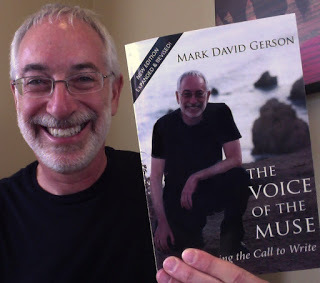 MDG: I have 12 books out: the three books in
The Q'ntana Trilogy
(
The MoonQuest
,
The StarQuest
and
SunQuest
), five books for writers, including the award-winning The Voice of the Muse: Answering the Call to Write, two memoirs, the inspirational Book of Messages and my latest, a novel called Sara's Year. Plus, I have a Sara's Year sequel in progress. (As well, I have adapted the three Q'ntana stories for the screen.) But asking which is my favorite would be like asking a parent to choose a favorite child. Each is meaningful to me in particular ways and each is a favorite for particular reasons!
MDG: I have 12 books out: the three books in
The Q'ntana Trilogy
(
The MoonQuest
,
The StarQuest
and
SunQuest
), five books for writers, including the award-winning The Voice of the Muse: Answering the Call to Write, two memoirs, the inspirational Book of Messages and my latest, a novel called Sara's Year. Plus, I have a Sara's Year sequel in progress. (As well, I have adapted the three Q'ntana stories for the screen.) But asking which is my favorite would be like asking a parent to choose a favorite child. Each is meaningful to me in particular ways and each is a favorite for particular reasons! BN: What were your feelings when you first saw the cover of of your first published book?
MDG: When I opened the FedEx envelope and pulled out my advance copy of The MoonQuest, I burst into tears. I didn’t expect to have that same reaction with my second book, The Voice of the Muse....but I did!
BN: If you gave some of your characters an opportunity to speak for themselves, what would they say?
MDG: What took you so long to get our story out??!? Seriously, I spoke to my characters while writing all three books in the fantasy trilogy. It was some of those conversations that led to some of the most surprising (to me) and powerful scenes in the books.
 BN: Are there any tips you would give a book club to better navigate their discussion of The MoonQuest?
BN: Are there any tips you would give a book club to better navigate their discussion of The MoonQuest?MDG: I would invite readers not only to look at the book from the outside, as readers, but to look at the journey the main characters undertake in the book through the lens of their own life experience. In other words, where does The MoonQuest speak to you, personally, in your life? In addition, I have a Reader's Guide to The MoonQuest, available free from my website.
BN: Who is your favorite character in The MoonQuest, and why?
MDG: I’ll answer this question as long as you don’t reveal my answer to the book’s main characters! My two favorite characters, I think, are the two quirkiest...the ones that always make me smile and sometimes make me laugh out loud: the Ferryman (he’s so minor that he has no name) and Pryma, a giant, one-eyed turtle-like creature, who makes a return appearance in The SunQuest.
BN: What was your favorite chapter to write and why?
MDG: Given that the first draft of The MoonQuest was one 400-page chapter, that one’s impossible to answer! As I mentioned earlier, I had no idea what the story was or where it was taking me, so I just kept writing, with no chapter breaks, until the first draft was done. I only added chapter and section breaks in later drafts. I did include chapter breaks in the first draft of The StarQuest and The SunQuest. Although they felt arbitrary at the time, my intuitive sensings must have been fairly accurate as most of those chapter breaks have changed.
BN: Can you see yourself in any of your characters?
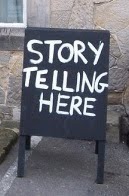 MDG: Authors who claim that they don’t see aspects of themselves in all their characters are either lying, blind or woefully un-self-aware. I am in all my characters, even (I hate to admit) the nastiest! In The MoonQuest, though, the character I most identify with is Toshar, the main character whose first-person account the story is. This young man who discovers his stories and his storytelling ability through his MoonQuest journey was very much a metaphor for the creative deepening that writing the book represented for me at that time in my life.
MDG: Authors who claim that they don’t see aspects of themselves in all their characters are either lying, blind or woefully un-self-aware. I am in all my characters, even (I hate to admit) the nastiest! In The MoonQuest, though, the character I most identify with is Toshar, the main character whose first-person account the story is. This young man who discovers his stories and his storytelling ability through his MoonQuest journey was very much a metaphor for the creative deepening that writing the book represented for me at that time in my life.BN: Has a review or profile ever changed your perspective on your work?
MDG: I haven’t had that experience with a review. But I have had it with reader comments. Two experiences in particular were surprising, and gratifying. In the first, a reader told me why the most difficult scenes in the book supported the story’s theme. Those were scenes that had been challenging for me to write, were often challenging for readers to read and, although I intuitively knew they belonged in the book, I couldn’t explain why. In the second instance, a reader brought up a theme that I hadn’t known was there but that made perfect sense to me once he mentioned it. Truly, my books are smarter than I am!
BN: Tell us your most rewarding experience since being published.
MDG: Although winning awards and getting great reviews for both books have been tremendously gratifying and validating, and although having a film producer primed to turn my books into movies is fabulously exciting, what’s most rewarding is when individual readers tell me how one or both of my books has affected them and, in some cases, changed their lives. This moving video, for example, was sent to me by one of my readers.
BN: What are your current projects?
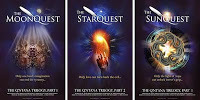 MDG: As I mentioned earlier, I'm working on a sequel to Sara's Year, tentatively titled After Sara's Year. It wasn't a book I planned to write, but so many Sara's Year readers asked for a sequel that I felt I had to give it try. Now, I'm excited to be discovering aspects of the original story and its characters that I didn't know when writing Sara's Year.
MDG: As I mentioned earlier, I'm working on a sequel to Sara's Year, tentatively titled After Sara's Year. It wasn't a book I planned to write, but so many Sara's Year readers asked for a sequel that I felt I had to give it try. Now, I'm excited to be discovering aspects of the original story and its characters that I didn't know when writing Sara's Year. BN: If you couldn’t be an author, what would your ideal career be?
MDG: My secret ambition would be to be a singer! More realistically, I’m also an artist and photographer and would be quite happy devoting more time to those creative pursuits. You can see some of my art and photography on my fine art website, as well as on Instagram.
BN: Do you have any advice for aspiring authors?
MDG: This is for all writers, not just aspiring ones! Trust the story, even if you don’t yet know what it is. Trust your innate creativity. Take it word by word and allow your pen or the keyboard to spell out the story for you. Allow yourself to be the passenger on your creative journey, not the driver. And, of course, get a copies of my books! Seriously, if you can begin to believe that your story always knows best, you’ll never go wrong.
 BN: Where is your favorite place to read/write?
BN: Where is your favorite place to read/write?MDG: I’m a bit of a café freak. I love reading and writing at Starbucks (as my Facebook friends/followers have discovered)!
BN: One of your favorite quotes?
MDG: From The MoonQuest: “You either trust or you do not. There is no halfway in between.”
BN: Where can your readers stalk you?
MDG: I'm easily stalkable in all the usual places! lolThe best place to contact me is either via my website or Facebook, or by leaving comments on my blog. I’m also on Google+ . FYI: I do my best to respond to all comments and queries...but sometimes it’s just not possible. But I read and appreciate them all.
Published on January 01, 2016 19:53
December 14, 2015
Rejected? Don't Feel Dejected!
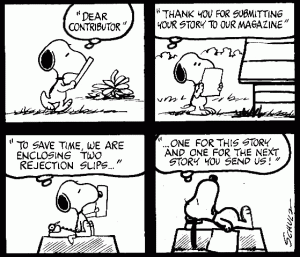
The literary world is littered with later-regretted rejections. My favorite, not because it’s the most extreme but because it involves an author whose work and life have profoundly influenced mine, involves Madeleine L’Engle, author of the young adult classic, A Wrinkle in Time.
L’Engle received two years’ worth of rejections from 26 publishers for A Wrinkle in Time, which was finally published in 1962 and went on to win major awards and be translated into more than a dozen languages.
Madeleine L’Engle was hardly unique..."I received your rejection by email recently, which was surprising since I did not submit an application to the Art San Diego Short Film Program. Like most artists, I am accustomed to having my work rejected, but being rejected from something I did not enter is a new low."– Shawnee Barton
Theodore Geisel’s first book as Dr. Seuss was turned down 27 times before landing a publishing contract. J.K. Rowling was rejected by a dozen publishers before Bloomsbury embraced the first Harry Potter novel.The original Chicken Soup for the Soul book was nixed by more than a hundred publishers before it launched a multimillion-dollar franchise.Publishing giant Alfred A. Knopf passed on George Orwell’s Animal Farm, as well as on Vladimir Nabokov and Sylvia Plath.Stephen King, discouraged after Carrie’s 30th rejection, tossed the manuscript into the trash. Fortunately, his wife retrieved it: Carrie sold more than a million copies in its first year; King is now ranked as one of the top-selling authors of all time. Other literary rebuffs? William Golding’s Lord of the Flies, Oscar Wilde’s Lady Windemere’s Fan, Joseph Heller’s Catch-22, John le Carré’s The Spy Who Came in from the Cold and F. Scott Fitzgerald’s The Great Gatsby.
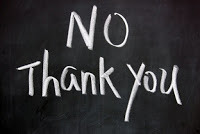
"I received your rejection by email recently, which was surprising since I did not submit an application to the Art San Diego Short Film Program. Like most artists, I am accustomed to having my work rejected, but being rejected from something I did not enter is a new low."– Shawnee Barton
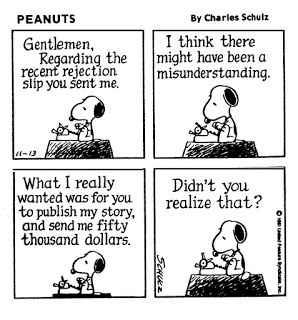 Six Tips for Dealing with RejectionWhen someone passes on your manuscript, regardless of the reason, here are six ways to help you get through and past the pain.
Six Tips for Dealing with RejectionWhen someone passes on your manuscript, regardless of the reason, here are six ways to help you get through and past the pain. 1. Feel What You Feel Don’t bottle up your feelings. Cry. Curse. Scream. Throw things. Throw up. Then get past the rejection and move on.
2. Write Your Feelings Powerful emotions birth powerful writing. Channel all you feel into one of your characters – if not as part of this story, then as part of another.
3. Take Writer's Revenge Write a scene where you subject the source of your rejection to something unspeakably hideous, hurtful and horrific. It’s the writer’s equivalent of sticking pins into a voodoo doll, and you'll have more fun writing it than you ever ought to admit!
4. Look for the Silver Lining Every experience, however emotionally debilitating, contains the seeds of something positive. Once the pain begins to subside, be open to a flash of insight that will reveal the silver lining around your storm cloud of rejection.
5. Look for the Spark of Truth If your rejection letter offers reasons for the turndown, pay attention to them and use your discernment to determine whether those reasons highlight real weaknesses that it would serve you to address in a new draft.
6. Keep Writing Don't let rejection stop you. Keep writing and keep seeking out ways to improve your craft.
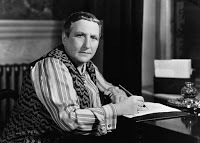 "I cannot read your M.S. three or four times. Not even one time. Only one look, only one look is enough. Hardly one copy would sell here. Hardly one. Hardly one."– Publisher Arthur C. Fifield's 1912 rejection letter to Gertrude Stein
"I cannot read your M.S. three or four times. Not even one time. Only one look, only one look is enough. Hardly one copy would sell here. Hardly one. Hardly one."– Publisher Arthur C. Fifield's 1912 rejection letter to Gertrude Stein
Ask Yourself These Questions When Faced with Criticism or RejectionCan I refuse to let criticism or rejection stop me from moving forward with this writing project?If I am unable to get an agent, a publishing deal or a screenplay option, can I trust that there may be other reasons why I was called to write this? Can I be okay with that? And Finally...Toward the end of her demoralizing two-year period of rejections, Madeleine L’Engle covered up her typewriter and decided to give up on writing. On her way to the kitchen, she had an epiphany: an idea for a novel about failure. In a flash, Madeleine L’Engle was back at her typewriter. “That night, I wrote in my journal, ‘I’m a writer. That’s who I am. That’s what I am. That’s what I have to do – even if I’m never, ever published again.’ And I had to take seriously the fact that I might never, ever be published again. It’s easy to say I’m a writer now, but I said it when it was hard to say. And I meant it.”
• Adapted from The Voice of the Muse: Answering the Call to Write, Birthing Your Book...Even If You Don't Know What It's About and Organic Screenwriting: Writing for Film Naturally. Read more about famous rejections and how to deal with yours in any of these books.
• This post first appeared in my newsletter. Subscribe now to get articles like this in your inbox as soon as they're posted!
Published on December 14, 2015 08:46
December 1, 2015
AIDS Beyond December 1
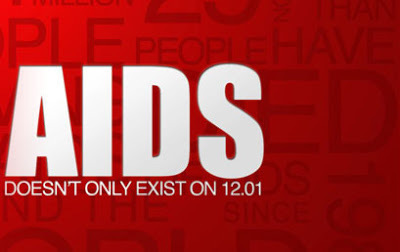 Although I am posting this memoir-excerpt-as-tribute on World AIDS Day, it's important to remember that AIDS/HIV is with us 365 days a year...and not only in the West and in the gay community.
Although I am posting this memoir-excerpt-as-tribute on World AIDS Day, it's important to remember that AIDS/HIV is with us 365 days a year...and not only in the West and in the gay community. I'm old enough to remember the first public awareness of AIDS in the gay community – first the fear and panic, then the extraordinary coming together in the face of tragic loss.
I'm also old enough to have lost too many friends to AIDS in those early years, when no one really understood what was going on or why.
One of those friends was Roy Salonin, so important to my own coming out all those decades ago in Montreal. Today I honor Roy with this excerpt from my Acts of Surrender memoir. Wherever you are, Roy, thank you!
But I also want to honor those more fortunate than Roy, those many have not only survived but have continued to live – and live passionately – with HIV. May they always remind us to celebrate life, whatever our age and HIV status...whatever our age and health status. And may they always inspire us to make this the last generation to have to know AIDS.
(By the way, the Ray David Blackman character in my Sara's Year novel is a silent tribute to the three friends who were so instrumental in my coming out and so supportive in the years that followed: Roy Salonin, David Brody and Harvey Blackman.)
Gay and JewishAdapted from Acts of Surrender: A Writer's Memoir © Mark David Gerson
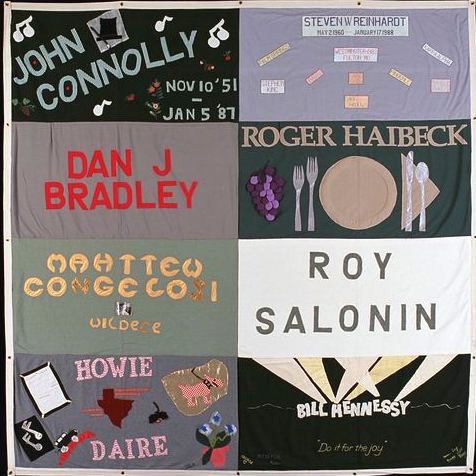 One evening in 1975, with my mother and stepfather safely out and my bedroom door firmly shut, I again dialed the number for Gay Montreal. This time, I forced myself to stay on the line.
One evening in 1975, with my mother and stepfather safely out and my bedroom door firmly shut, I again dialed the number for Gay Montreal. This time, I forced myself to stay on the line.“Good evening, Gay Montreal,” a pleasant male voice answered.
“I-I think I’m gay,” I stammered after saying nothing for what seemed decades but was likely little more than a breath.
Charles was a pro, expertly navigating me through my fears, reassuring me that I wasn’t alone and inviting me in for a counseling session.
 Next afternoon, freshly showered and looking my twenty-year-old best, I walked into the Peel Street greystone that housed Gay Montreal. Compassionate and to the point, Charles looked me up and down and asked, “Are you Jewish?”
Next afternoon, freshly showered and looking my twenty-year-old best, I walked into the Peel Street greystone that housed Gay Montreal. Compassionate and to the point, Charles looked me up and down and asked, “Are you Jewish?”Having been born into a generation of Jews with a contemporary knowledge of the Holocaust and firsthand experience of anti-Semitism, I couldn’t help but react inwardly to Charles’s question with a genetic spark of paranoia.
Trying to wipe my upbringing from my mind, I nodded.
“Then you’ve got to meet Roy Salonin!” he exclaimed.
I raised my eyebrows.
“Roy Salonin. He runs a gay Jewish group. It’s called Naches.” He pronounced it na-kess. Charles scribbled a phone number on a scrap of paper and shoved it across the desk at me. “Call him,” he insisted.
 Next I knew I was back on Peel Street, Charles having already faded into some recess of my past. Cars pushed past me up the steep hill. Crushes of McGill students swallowed me up and spit me out as they rushed to class. I was oblivious to it all. A gay Jewish group? A gay Jewish group? Called Naches? Talk about chutzpah! Naches is a Yiddish word that expresses the joy a parent only gets from children. For a moment, I wondered how much naches I would bring my mother when I told her I was gay. Only for a moment. With my next breath, I felt calmer and more alive than I had felt in months. A gay Jewish group!
Next I knew I was back on Peel Street, Charles having already faded into some recess of my past. Cars pushed past me up the steep hill. Crushes of McGill students swallowed me up and spit me out as they rushed to class. I was oblivious to it all. A gay Jewish group? A gay Jewish group? Called Naches? Talk about chutzpah! Naches is a Yiddish word that expresses the joy a parent only gets from children. For a moment, I wondered how much naches I would bring my mother when I told her I was gay. Only for a moment. With my next breath, I felt calmer and more alive than I had felt in months. A gay Jewish group!For the next eight years, the group that Roy Salonin had created formed the cornerstone of my gay experience. I attended weekly meetings and became one of the group’s organizers. I demonstrated with fellow members to protest police raids on gay bars and bathhouses. I wrote provincial and national legislators on behalf of the group to press for equal rights. I manned the Naches booth at the city’s early Gay Pride celebrations. I let my name be used in articles in the Montreal Gazette and Canadian Jewish News, then sifted through the resulting answering machine messages — all ugly or obscene.
The hateful comments didn’t matter. For the first time in a long time, I felt like I belonged and was comfortable with who I was. No one was going to take that away from me.
 Read more about my many coming out-type experiences – and much more – in Acts of Surrender: A Writer's Memoir, available in paperback and ebook from major online booksellers or signed by me to you from my website.
Read more about my many coming out-type experiences – and much more – in Acts of Surrender: A Writer's Memoir, available in paperback and ebook from major online booksellers or signed by me to you from my website.Photos: Roy Salonin's square on the AIDS Memorial Quilt; "Peel Street Golden Square Mile 1" by abdallahh from Montréal. Licensed under Creative Commons Attribution 2.0 via Wikimedia Commons.
Published on December 01, 2015 07:49
November 15, 2015
My Top 10 Book-Writing Tips...
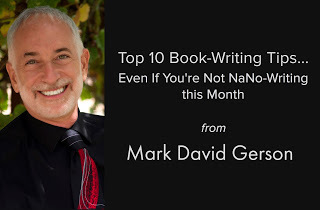 In an interview a few days ago, I was asked whether I had any tips for writers participating in National Novel Writing Month, or NaNoWriMo, as it's popularly called. I did, and it wasn't the conventional NaNoWriMo-related guidance, which is generally geared toward the nuts-and-bolts of cranking out a 50,000-word manuscript in 30 days.
In an interview a few days ago, I was asked whether I had any tips for writers participating in National Novel Writing Month, or NaNoWriMo, as it's popularly called. I did, and it wasn't the conventional NaNoWriMo-related guidance, which is generally geared toward the nuts-and-bolts of cranking out a 50,000-word manuscript in 30 days.(Yes, that's what NaNoWriMo is all about: spending November producing a novel-draft of at least 50,000 words.)
When the interview was over, I realized that much of the advice I had offered applied to all writers, not just NaNoWriters, and that it could be distilled into 10 tips. So here they are...
My Top Ten Tips
 1. You Don't Have to Know What Your Book Is About Before Starting.
1. You Don't Have to Know What Your Book Is About Before Starting.I have rarely known what my books were about before I began writing them. With The MoonQuest, The Voice of the Muse: Answering the Call to Write and Dialogues with the Divine: Encounters with My Wisest Self, I didn't even know I was writing a book when I started! It's those experiences that prompted me to write Birthing Your Book...Even If You Don't Know What It's About , a step-by-step guide to getting your book out, whether or not you think you know what you're doing.
2. You Don't Need to Plot, Plan, Outline or Otherwise Prepare.
Of course, you can plot, plan, outline or otherwise prepare. There's no right or wrong way to write a book...or any other creative project. The only right-write way is the way that works for you on this book. (It might be different next time!) Just so you know, though, I have never outlined. Nothing. Ever. Not even my screenplays, which orthodox screenwriting lore would have you believe is compulsory. (That's why I wrote Organic Screenwriting: Writing for Film, Naturally – to free you from creativity-stifling orthodoxy.)
So how do you begin? With one word, any word. And then another and another and another. And another. No stopping. No editing. No censoring. No going back. Just racing forward through and past the fear, anxiety and inevitable nonsense and into the story that will reveal itself to you through the writing of it, if you get out of its way and let it. That's a Cliff's Notes version of my "Writing on the Muse Stream" method. Read more about it in any of my books for writers.
3. Forget the Rules. All of Them.
All my books for writers include a set of tongue-in-cheek "rules" for writers. And although they vary depending on the book's theme, they all share the same first and final rule: There are no rules. Whether during November's NaNoWriMo or beyond, write the book (or short story or poem or screenplay or stage play or essay) that demands to be written as it demands to be written, not according to anyone else's rules or strictures.
You haven't started yet? Start today. Now. Or start on Nov. 15 or Nov 20 or Nov. 30. Just start!Your book is a memoir or other non-fiction work? Or it's not a book at all but a screenplay? Celebrate the fact that you're writing something instead of beating yourself up for not having written a novel. The fact that you’re writing, that you’re moving forward with a project you’re passionate about, is more important than form, medium or genre.Your draft is shorter than 50,000 words? Celebrate that you've finished your draft instead of mourning the fact that you didn't meet NaNoWriMo's arbitrary word count. You don't finish by November 30? So what! However many words you have written are more words than you would have written had you not launched the process. When the time comes, celebrate that.
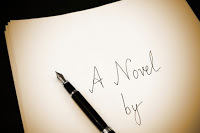 4. Don't Judge.Just as you're not judging your process (see Tip #3), don't judge your output. If you're participating in NaNoWriMo, you're racing against the calendar to meet a November 30 deadline (See Tips #2 and #3); you have no time to fix 'n fuss as you go. That's a good thing. The most uncreative thing you can do is edit while you write that first draft...of anything. NaNoWriMo or not, let your first draft be as chaotic, repetitive, inconsistent and illogical as it needs to be. Just get your story onto the page, however it comes out. Use subsequent drafts to polish, hone and refine your rough stone into the jewel it was meant to be.
4. Don't Judge.Just as you're not judging your process (see Tip #3), don't judge your output. If you're participating in NaNoWriMo, you're racing against the calendar to meet a November 30 deadline (See Tips #2 and #3); you have no time to fix 'n fuss as you go. That's a good thing. The most uncreative thing you can do is edit while you write that first draft...of anything. NaNoWriMo or not, let your first draft be as chaotic, repetitive, inconsistent and illogical as it needs to be. Just get your story onto the page, however it comes out. Use subsequent drafts to polish, hone and refine your rough stone into the jewel it was meant to be. 5. Trust Your Book.Your book and its characters (if it's a novel) are smarter than you are. Get out of their way (and your own) and let them tell their story through you. Abandon control!
6. It's Okay to Be Out-of-Order.Like movies, which are rarely filmed in sequence, your first (or second or third) draft may not write itself in final book order. That's okay. In this as in all aspects of your book-writing enterprise, let the bits and pieces of your book come as they come...and write them that way, knowing that the book’s innate wisdom will determine the appropriate order when the time is right.
7. Take Risks.
 Creative expression is about risk-taking. It's about pushing boundaries – your own as well as those of others. It’s about boarding Star Trek’s starship Enterprise, taking off for parts unknown and journeying to the edges of the creative universe. Commit to taking more risks. Commit to the creative artist you are.
Creative expression is about risk-taking. It's about pushing boundaries – your own as well as those of others. It’s about boarding Star Trek’s starship Enterprise, taking off for parts unknown and journeying to the edges of the creative universe. Commit to taking more risks. Commit to the creative artist you are.8. Do the Best You Can, and Let It Be Good Enough.Your book may be excellent, accomplished, creative and insightful. It may be brilliant, compelling and universally lauded. But perfect? Not possible. It’s not possible because when we translate an idea or concept into language, we’re taking something that is infinite (energy) and dynamic (neural impulses) and converting it into something that is finite (language) and static (squiggles on a page). The resulting “translation” can never be more than an approximation. Do the best you can, and let it be good enough...because your book will never be perfect. Ever.
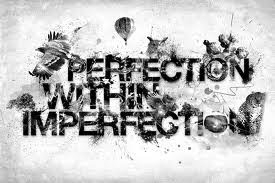 9. Write
9. WriteIt seems obvious, particularly in a month devoted to novel-writing. But it can be easy to put writing aside in favor of research. It’s even easier to put writing aside while you try to figure what your book is about.
Don’t wait to figure out what your book is about. Don’t worry about its direction, theme, structure or focus. Don’t worry about chapter breaks (my first MoonQuest draft had none). Don’t worry about what people will think of it, or of you. Don’t worry about anything. Set pen to paper or fingers to keyboard and, without judging or second-guessing what emerges, let your book do its wizardly work – on you as much as on the page.
In other words: Write...the book you didn’t know you had in you...the book you could never have imagined writing...the book you believed you could not write...the book that is yours to write.
10. There Are No RulesAs I noted in Tip #3, this is the one rule that never changes. No matter what you’re writing, the only certainties are that flow is fluid, your creation is unique and your book makes its own rules. Truly, there is no universal right way or wrong way. There is only your way, the way of your book.
My NaNoWriMo
 You're probably wondering whether I have ever participated in NaNoWriMo. The answer is yes. Two years ago, I wrote
The SunQuest
, the third and final installment in my
Q'ntana
fantasy trilogy, during NaNoWriMo. Amazingly, I did it in 21 days.
You're probably wondering whether I have ever participated in NaNoWriMo. The answer is yes. Two years ago, I wrote
The SunQuest
, the third and final installment in my
Q'ntana
fantasy trilogy, during NaNoWriMo. Amazingly, I did it in 21 days. 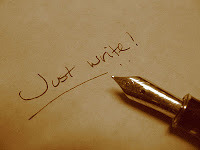 But not every book can be written in 21 days...or 30.
The StarQuest
,
The Q'ntana Trilogy
's Book II, took me 11 years and two false starts to get from the first to the final word of a first draft!
But not every book can be written in 21 days...or 30.
The StarQuest
,
The Q'ntana Trilogy
's Book II, took me 11 years and two false starts to get from the first to the final word of a first draft!However long it takes, the important thing is that you're writing. So hurry up and finish this newsletter, open your notebook or writing application and WRITE!
And Now, for a Little Inspiration...
"You are a writer of power, passion, strength and courage."
An inspiring meditative experience designed to reaffirm your innate creativity, writing ability and identity as a writer
The audio is a track from my recording, The Voice of the Muse Companion: Guided Meditations for Writers, available on MP3 and CD on my website, from iTunes, Amazon, Google Play and CD Baby, and on Apple Music. The photography is mine; see more on Instagram (@markdavidgerson) or my photo website
Published on November 15, 2015 10:11
Top 10 NaNoWriMo Book-Writing Tips...
Even If You're Not NaNo-Writing this Month
 In an interview a few days ago, I was asked whether I had any tips for writers participating in National Novel Writing Month, or NaNoWriMo, as it's popularly called. I did, and it wasn't the conventional NaNoWriMo-related guidance, which is generally geared toward the nuts-and-bolts of cranking out a 50,000-word manuscript in 30 days.
In an interview a few days ago, I was asked whether I had any tips for writers participating in National Novel Writing Month, or NaNoWriMo, as it's popularly called. I did, and it wasn't the conventional NaNoWriMo-related guidance, which is generally geared toward the nuts-and-bolts of cranking out a 50,000-word manuscript in 30 days.
(Yes, that's what NaNoWriMo is all about: spending November producing a novel-draft of at least 50,000 words.)
When the interview was over, I realized that much of the advice I had offered applied to all writers, not just NaNoWriters, and that it could be distilled into 10 tips. So here they are...
My Top Ten Tips
 1. You Don't Have to Know What Your Book Is About Before Starting.
1. You Don't Have to Know What Your Book Is About Before Starting.
I have rarely known what my books were about before I began writing them. With The MoonQuest, The Voice of the Muse: Answering the Call to Write and Dialogues with the Divine: Encounters with My Wisest Self, I didn't even know I was writing a book when I started! It's those experiences that prompted me to write Birthing Your Book...Even If You Don't Know What It's About , a step-by-step guide to getting your book out, whether or not you think you know what you're doing.
2. You Don't Need to Plot, Plan, Outline or Otherwise Prepare.
Of course, you can plot, plan, outline or otherwise prepare. There's no right or wrong way to write a book...or any other creative project. The only right-write way is the way that works for you on this book. (It might be different next time!) Just so you know, though, I have never outlined. Nothing. Ever. Not even my screenplays, which orthodox screenwriting lore would have you believe is compulsory. (That's why I wrote Organic Screenwriting: Writing for Film, Naturally – to free you from creativity-stifling orthodoxy.)
So how do you begin? With one word, any word. And then another and another and another. And another. No stopping. No editing. No censoring. No going back. Just racing forward through and past the fear, anxiety and inevitable nonsense and into the story that will reveal itself to you through the writing of it, if you get out of its way and let it. That's a Cliff's Notes version of my "Writing on the Muse Stream" method. Read more about it in any of my books for writers.
3. Forget the Rules. All of Them.
All my books for writers include a set of tongue-in-cheek "rules" for writers. And although they vary depending on the book's theme, they all share the same first and final rule: There are no rules. Whether during November's NaNoWriMo or beyond, write the book (or short story or poem or screenplay or stage play or essay) that demands to be written as it demands to be written, not according to anyone else's rules or strictures.
You haven't started yet? Start today. Now. Or start on Nov. 15 or Nov 20 or Nov. 30. Just start!Your book is a memoir or other non-fiction work? Or it's not a book at all but a screenplay? Celebrate the fact that you're writing something instead of beating yourself up for not having written a novel. The fact that you’re writing, that you’re moving forward with a project you’re passionate about, is more important than form, medium or genre.Your draft is shorter than 50,000 words? Celebrate that you've finished your draft instead of mourning the fact that you didn't meet NaNoWriMo's arbitrary word count. You don't finish by November 30? So what! However many words you have written are more words than you would have written had you not launched the process. When the time comes, celebrate that.
 4. Don't Judge.Just as you're not judging your process (see Tip #3), don't judge your output. If you're participating in NaNoWriMo, you're racing against the calendar to meet a November 30 deadline (See Tips #2 and #3); you have no time to fix 'n fuss as you go. That's a good thing. The most uncreative thing you can do is edit while you write that first draft...of anything. NaNoWriMo or not, let your first draft be as chaotic, repetitive, inconsistent and illogical as it needs to be. Just get your story onto the page, however it comes out. Use subsequent drafts to polish, hone and refine your rough stone into the jewel it was meant to be.
4. Don't Judge.Just as you're not judging your process (see Tip #3), don't judge your output. If you're participating in NaNoWriMo, you're racing against the calendar to meet a November 30 deadline (See Tips #2 and #3); you have no time to fix 'n fuss as you go. That's a good thing. The most uncreative thing you can do is edit while you write that first draft...of anything. NaNoWriMo or not, let your first draft be as chaotic, repetitive, inconsistent and illogical as it needs to be. Just get your story onto the page, however it comes out. Use subsequent drafts to polish, hone and refine your rough stone into the jewel it was meant to be.
5. Trust Your Book.Your book and its characters (if it's a novel) are smarter than you are. Get out of their way (and your own) and let them tell their story through you. Abandon control!
6. It's Okay to Be Out-of-Order.Like movies, which are rarely filmed in sequence, your first (or second or third) draft may not write itself in final book order. That's okay. In this as in all aspects of your book-writing enterprise, let the bits and pieces of your book come as they come...and write them that way, knowing that the book’s innate wisdom will determine the appropriate order when the time is right.
7. Take Risks. Creative expression is about risk-taking. It's about pushing boundaries – your own as well as those of others. It’s about boarding Star Trek’s starship Enterprise, taking off for parts unknown and journeying to the edges of the creative universe. Commit to taking more risks. Commit to the creative artist you are.
Creative expression is about risk-taking. It's about pushing boundaries – your own as well as those of others. It’s about boarding Star Trek’s starship Enterprise, taking off for parts unknown and journeying to the edges of the creative universe. Commit to taking more risks. Commit to the creative artist you are.
8. Do the Best You Can, and Let It Be Good Enough.Your book may be excellent, accomplished, creative and insightful. It may be brilliant, compelling and universally lauded. But perfect? Not possible. It’s not possible because when we translate an idea or concept into language, we’re taking something that is infinite (energy) and dynamic (neural impulses) and converting it into something that is finite (language) and static (squiggles on a page). The resulting “translation” can never be more than an approximation. Do the best you can, and let it be good enough...because your book will never be perfect. Ever.
 9. Write
9. Write
It seems obvious, particularly in a month devoted to novel-writing. But it can be easy to put writing aside in favor of research. It’s even easier to put writing aside while you try to figure what your book is about.
Don’t wait to figure out what your book is about. Don’t worry about its direction, theme, structure or focus. Don’t worry about chapter breaks (my first MoonQuest draft had none). Don’t worry about what people will think of it, or of you. Don’t worry about anything. Set pen to paper or fingers to keyboard and, without judging or second-guessing what emerges, let your book do its wizardly work – on you as much as on the page.
In other words: Write...the book you didn’t know you had in you...the book you could never have imagined writing...the book you believed you could not write...the book that is yours to write.
10. There Are No RulesAs I noted in Tip #3, this is the one rule that never changes. No matter what you’re writing, the only certainties are that flow is fluid, your creation is unique and your book makes its own rules. Truly, there is no universal right way or wrong way. There is only your way, the way of your book.
My NaNoWriMo You're probably wondering whether I have ever participated in NaNoWriMo. The answer is yes. Two years ago, I wrote
The SunQuest
, the third and final installment in my
Q'ntana
fantasy trilogy, during NaNoWriMo. Amazingly, I did it in 21 days.
You're probably wondering whether I have ever participated in NaNoWriMo. The answer is yes. Two years ago, I wrote
The SunQuest
, the third and final installment in my
Q'ntana
fantasy trilogy, during NaNoWriMo. Amazingly, I did it in 21 days.
 But not every book can be written in 21 days...or 30.
The StarQuest
,
The Q'ntana Trilogy
's Book II, took me 11 years and two false starts to get from the first to the final word of a first draft!
But not every book can be written in 21 days...or 30.
The StarQuest
,
The Q'ntana Trilogy
's Book II, took me 11 years and two false starts to get from the first to the final word of a first draft!
However long it takes, the important thing is that you're writing. So hurry up and finish this newsletter, open your notebook or writing application and WRITE!
And Now, for a Little Inspiration...
"You are a writer of power, passion, strength and courage."
An inspiring meditative experience designed to reaffirm your innate creativity, writing ability and identity as a writer
The audio is a track from my recording, The Voice of the Muse Companion: Guided Meditations for Writers, available on MP3 and CD on my website, from iTunes, Amazon, Google Play and CD Baby, and on Apple Music. The photography is mine; see more on Instagram (@markdavidgerson) or my photo website
 In an interview a few days ago, I was asked whether I had any tips for writers participating in National Novel Writing Month, or NaNoWriMo, as it's popularly called. I did, and it wasn't the conventional NaNoWriMo-related guidance, which is generally geared toward the nuts-and-bolts of cranking out a 50,000-word manuscript in 30 days.
In an interview a few days ago, I was asked whether I had any tips for writers participating in National Novel Writing Month, or NaNoWriMo, as it's popularly called. I did, and it wasn't the conventional NaNoWriMo-related guidance, which is generally geared toward the nuts-and-bolts of cranking out a 50,000-word manuscript in 30 days.(Yes, that's what NaNoWriMo is all about: spending November producing a novel-draft of at least 50,000 words.)
When the interview was over, I realized that much of the advice I had offered applied to all writers, not just NaNoWriters, and that it could be distilled into 10 tips. So here they are...
My Top Ten Tips
 1. You Don't Have to Know What Your Book Is About Before Starting.
1. You Don't Have to Know What Your Book Is About Before Starting.I have rarely known what my books were about before I began writing them. With The MoonQuest, The Voice of the Muse: Answering the Call to Write and Dialogues with the Divine: Encounters with My Wisest Self, I didn't even know I was writing a book when I started! It's those experiences that prompted me to write Birthing Your Book...Even If You Don't Know What It's About , a step-by-step guide to getting your book out, whether or not you think you know what you're doing.
2. You Don't Need to Plot, Plan, Outline or Otherwise Prepare.
Of course, you can plot, plan, outline or otherwise prepare. There's no right or wrong way to write a book...or any other creative project. The only right-write way is the way that works for you on this book. (It might be different next time!) Just so you know, though, I have never outlined. Nothing. Ever. Not even my screenplays, which orthodox screenwriting lore would have you believe is compulsory. (That's why I wrote Organic Screenwriting: Writing for Film, Naturally – to free you from creativity-stifling orthodoxy.)
So how do you begin? With one word, any word. And then another and another and another. And another. No stopping. No editing. No censoring. No going back. Just racing forward through and past the fear, anxiety and inevitable nonsense and into the story that will reveal itself to you through the writing of it, if you get out of its way and let it. That's a Cliff's Notes version of my "Writing on the Muse Stream" method. Read more about it in any of my books for writers.
3. Forget the Rules. All of Them.
All my books for writers include a set of tongue-in-cheek "rules" for writers. And although they vary depending on the book's theme, they all share the same first and final rule: There are no rules. Whether during November's NaNoWriMo or beyond, write the book (or short story or poem or screenplay or stage play or essay) that demands to be written as it demands to be written, not according to anyone else's rules or strictures.
You haven't started yet? Start today. Now. Or start on Nov. 15 or Nov 20 or Nov. 30. Just start!Your book is a memoir or other non-fiction work? Or it's not a book at all but a screenplay? Celebrate the fact that you're writing something instead of beating yourself up for not having written a novel. The fact that you’re writing, that you’re moving forward with a project you’re passionate about, is more important than form, medium or genre.Your draft is shorter than 50,000 words? Celebrate that you've finished your draft instead of mourning the fact that you didn't meet NaNoWriMo's arbitrary word count. You don't finish by November 30? So what! However many words you have written are more words than you would have written had you not launched the process. When the time comes, celebrate that.
 4. Don't Judge.Just as you're not judging your process (see Tip #3), don't judge your output. If you're participating in NaNoWriMo, you're racing against the calendar to meet a November 30 deadline (See Tips #2 and #3); you have no time to fix 'n fuss as you go. That's a good thing. The most uncreative thing you can do is edit while you write that first draft...of anything. NaNoWriMo or not, let your first draft be as chaotic, repetitive, inconsistent and illogical as it needs to be. Just get your story onto the page, however it comes out. Use subsequent drafts to polish, hone and refine your rough stone into the jewel it was meant to be.
4. Don't Judge.Just as you're not judging your process (see Tip #3), don't judge your output. If you're participating in NaNoWriMo, you're racing against the calendar to meet a November 30 deadline (See Tips #2 and #3); you have no time to fix 'n fuss as you go. That's a good thing. The most uncreative thing you can do is edit while you write that first draft...of anything. NaNoWriMo or not, let your first draft be as chaotic, repetitive, inconsistent and illogical as it needs to be. Just get your story onto the page, however it comes out. Use subsequent drafts to polish, hone and refine your rough stone into the jewel it was meant to be. 5. Trust Your Book.Your book and its characters (if it's a novel) are smarter than you are. Get out of their way (and your own) and let them tell their story through you. Abandon control!
6. It's Okay to Be Out-of-Order.Like movies, which are rarely filmed in sequence, your first (or second or third) draft may not write itself in final book order. That's okay. In this as in all aspects of your book-writing enterprise, let the bits and pieces of your book come as they come...and write them that way, knowing that the book’s innate wisdom will determine the appropriate order when the time is right.
7. Take Risks.
 Creative expression is about risk-taking. It's about pushing boundaries – your own as well as those of others. It’s about boarding Star Trek’s starship Enterprise, taking off for parts unknown and journeying to the edges of the creative universe. Commit to taking more risks. Commit to the creative artist you are.
Creative expression is about risk-taking. It's about pushing boundaries – your own as well as those of others. It’s about boarding Star Trek’s starship Enterprise, taking off for parts unknown and journeying to the edges of the creative universe. Commit to taking more risks. Commit to the creative artist you are.8. Do the Best You Can, and Let It Be Good Enough.Your book may be excellent, accomplished, creative and insightful. It may be brilliant, compelling and universally lauded. But perfect? Not possible. It’s not possible because when we translate an idea or concept into language, we’re taking something that is infinite (energy) and dynamic (neural impulses) and converting it into something that is finite (language) and static (squiggles on a page). The resulting “translation” can never be more than an approximation. Do the best you can, and let it be good enough...because your book will never be perfect. Ever.
 9. Write
9. WriteIt seems obvious, particularly in a month devoted to novel-writing. But it can be easy to put writing aside in favor of research. It’s even easier to put writing aside while you try to figure what your book is about.
Don’t wait to figure out what your book is about. Don’t worry about its direction, theme, structure or focus. Don’t worry about chapter breaks (my first MoonQuest draft had none). Don’t worry about what people will think of it, or of you. Don’t worry about anything. Set pen to paper or fingers to keyboard and, without judging or second-guessing what emerges, let your book do its wizardly work – on you as much as on the page.
In other words: Write...the book you didn’t know you had in you...the book you could never have imagined writing...the book you believed you could not write...the book that is yours to write.
10. There Are No RulesAs I noted in Tip #3, this is the one rule that never changes. No matter what you’re writing, the only certainties are that flow is fluid, your creation is unique and your book makes its own rules. Truly, there is no universal right way or wrong way. There is only your way, the way of your book.
My NaNoWriMo
 You're probably wondering whether I have ever participated in NaNoWriMo. The answer is yes. Two years ago, I wrote
The SunQuest
, the third and final installment in my
Q'ntana
fantasy trilogy, during NaNoWriMo. Amazingly, I did it in 21 days.
You're probably wondering whether I have ever participated in NaNoWriMo. The answer is yes. Two years ago, I wrote
The SunQuest
, the third and final installment in my
Q'ntana
fantasy trilogy, during NaNoWriMo. Amazingly, I did it in 21 days.  But not every book can be written in 21 days...or 30.
The StarQuest
,
The Q'ntana Trilogy
's Book II, took me 11 years and two false starts to get from the first to the final word of a first draft!
But not every book can be written in 21 days...or 30.
The StarQuest
,
The Q'ntana Trilogy
's Book II, took me 11 years and two false starts to get from the first to the final word of a first draft!However long it takes, the important thing is that you're writing. So hurry up and finish this newsletter, open your notebook or writing application and WRITE!
And Now, for a Little Inspiration...
"You are a writer of power, passion, strength and courage."
An inspiring meditative experience designed to reaffirm your innate creativity, writing ability and identity as a writer
The audio is a track from my recording, The Voice of the Muse Companion: Guided Meditations for Writers, available on MP3 and CD on my website, from iTunes, Amazon, Google Play and CD Baby, and on Apple Music. The photography is mine; see more on Instagram (@markdavidgerson) or my photo website
Published on November 15, 2015 10:11
November 14, 2015
Reflections on the Paris Terror Attacks
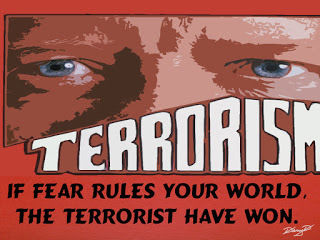 While we rightfully mourn the victims of the terrorist attacks in Paris and condemn those who carried them out, let us also mourn all victims of terrorism, whatever their nationality, and condemn all terrorists, wherever they are found.
While we rightfully mourn the victims of the terrorist attacks in Paris and condemn those who carried them out, let us also mourn all victims of terrorism, whatever their nationality, and condemn all terrorists, wherever they are found.Let us also remember that no religion is terrorist by nature. At their core, all major religions preach peace, love and brotherhood. Unfortunately, all major religions have extremists in their midst who would warp their faith's fundamental teachings in order to persecute, torture or kill.
Those extremists live in every country, including yours and mine. They are citizens of every country, including yours and mine.
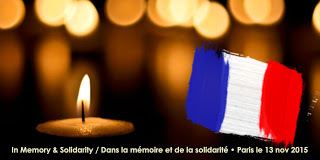 We may slow down these extremists with our hate-filled words and actions, but we won't stop them. Bombs and bombast can never stop what our fear feeds.
We may slow down these extremists with our hate-filled words and actions, but we won't stop them. Bombs and bombast can never stop what our fear feeds.Yes, sometimes force is a necessary immediate-term response. But it's never a long-term solution. War breeds more war, terror breeds more terror and hatred breeds more hatred. Unless we commit to stopping it, the cycle is infinite.
Only by acknowledging and owning our fears can we be free of hatred and only by walking through and past those fears can we be free of terror, terrorism and terrorists.
Let's start today.
Published on November 14, 2015 22:16
October 16, 2015
Karen Helene Walker: The Voice of Her Muse
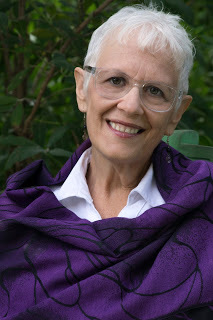 I first met Karen Helene Walker in a typically synchronistic fashion: On her way to a meeting of the New Mexico Book Co-op, Karen stumbled on my then-new book, The Voice of the Muse: Answering the Call to Write, in an Albuquerque bookstore. She was intrigued but didn't buy a copy. But when she arrived at her meeting, she found herself sitting next to its author (me!); I was there to announce the book's release. Karen bought a copy on the spot and soon became both a client and a friend.
I first met Karen Helene Walker in a typically synchronistic fashion: On her way to a meeting of the New Mexico Book Co-op, Karen stumbled on my then-new book, The Voice of the Muse: Answering the Call to Write, in an Albuquerque bookstore. She was intrigued but didn't buy a copy. But when she arrived at her meeting, she found herself sitting next to its author (me!); I was there to announce the book's release. Karen bought a copy on the spot and soon became both a client and a friend. As Karen recounts in this guest blog post, I worked with her off and on over the years that followed on the book that would become The Wishing Steps. I am honored to have been part of her journey and gratified to be able to introduce her to you today, on the occasion of the release of The Wishing Steps!
I was minding my own business. Really. We’d just arrived in Edinburgh, Scotland for what would be a two-week exploration of both Scotland and Ireland. Our driver took us to a 2,000-year-old burial site, Balnauran of Clava and I was off by myself, fascinated by the ancient history and culture and imagining what these people might have been like when an unfamiliar voice said, “Tell my story.” There was no one around me. My husband and our guide were way off exploring the cairns (piles of stones).
Now, you have to understand, I’m 66 years old and, until that day, I’d never heard voices that weren’t my own inner ones. This was different. I wasn’t sure what I’d heard or even if I actually did hear anything, so I said, “Sorry, I’m on vacation.”
 The voice came back while standing on what was called the wishing steps in a dense forest surrounding Blarney Castle in Ireland. “Tell my story.” This time, I felt a surge of energy at the same time. Hard to ignore, but ignore it I did. “I’m on vacation. Leave me alone.”
The voice came back while standing on what was called the wishing steps in a dense forest surrounding Blarney Castle in Ireland. “Tell my story.” This time, I felt a surge of energy at the same time. Hard to ignore, but ignore it I did. “I’m on vacation. Leave me alone.”But when I returned home, I couldn’t forget or ignore any longer what happened. I began a journey to discover whom the voice belonged to and what story it wanted me to tell. I called my writing coach/editor, Mark David Gerson, and the first words out of my mouth were, “I don’t tell stories. I can’t write fiction. I’m a nonfiction writer.”
I’d tried to write fiction when I went back to university in my fifties. I took every creative writing course the school had to offer and even graduated Summa Cum Laude, but when it came to writing fiction, it just didn’t come naturally, despite my high grades. My mind appears to be quite literal – it doesn’t think in metaphors and similes. I have to work hard at coming up with something that isn’t a cliché. So I was pretty convinced I couldn’t do it.
The first thing Mark David said to me was, “Open your mind and heart to the story and allow it to reveal itself. That’s all that matters. You don’t have to map it out or outline. Just allow it to emerge, one word at a time.”
Later on in the six-year journey I remember him saying, “Creativity is as natural as breathing, and as necessary. Just by writing from that deep place changes you and changes the world.” And when I felt overwhelmed and frightened because I had no clue what to do next, he said, “You’re in the passenger seat – the story is driving.”
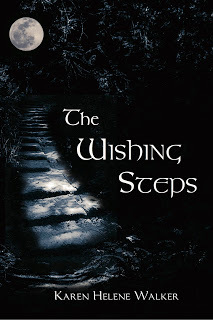 Little did I know that in that first session with Mark David back in 2009, when I asked, “What am I to do about this voice?” it would be the start of what became a profoundly healing and deeply moving spiritual journey. I believe the voice that came to me in Scotland was a Goddess. I wasn’t clear at first what story I was to tell, but soon I came to understand that I was to imagine what it might have been like when the Goddess came to the first woman in prehistoric times to share Her wisdom. And then to imagine how that wisdom continued to be shared through the Dark Times of the Middle Ages through to modern times. It also became clear that the story was not meant to be historical fiction. That was a relief. Research is not one of my favorite activities, although I did have to research some for this book.
Little did I know that in that first session with Mark David back in 2009, when I asked, “What am I to do about this voice?” it would be the start of what became a profoundly healing and deeply moving spiritual journey. I believe the voice that came to me in Scotland was a Goddess. I wasn’t clear at first what story I was to tell, but soon I came to understand that I was to imagine what it might have been like when the Goddess came to the first woman in prehistoric times to share Her wisdom. And then to imagine how that wisdom continued to be shared through the Dark Times of the Middle Ages through to modern times. It also became clear that the story was not meant to be historical fiction. That was a relief. Research is not one of my favorite activities, although I did have to research some for this book.Allowing the voice of wisdom that came to me in Scotland to come through to tell her story didn’t happen easily. I was kicking and screaming the whole six years it took to yank this story out of me. My debut novel The Wishing Steps is the result.
 I think the reason I was called, and I do feel that this was a calling to write this book, is to share how important it is to listen to that voice of wisdom when it comes. So often we are so busy we don’t even hear it. Or we hear it but ignore it because it might be too hard or it might hurt someone we care about. It’s not a coincidence that my memoir,
Following the Whispers
, was also about listening to our intuition. It seems this is a lesson I must learn in this lifetime because it continues to reveal itself in everything I write. I’m so grateful this voice wouldn’t leave me alone. And as difficult as it may be to follow our inner guidance, I wouldn’t have it any other way.
I think the reason I was called, and I do feel that this was a calling to write this book, is to share how important it is to listen to that voice of wisdom when it comes. So often we are so busy we don’t even hear it. Or we hear it but ignore it because it might be too hard or it might hurt someone we care about. It’s not a coincidence that my memoir,
Following the Whispers
, was also about listening to our intuition. It seems this is a lesson I must learn in this lifetime because it continues to reveal itself in everything I write. I’m so grateful this voice wouldn’t leave me alone. And as difficult as it may be to follow our inner guidance, I wouldn’t have it any other way.Have you ever heard an inner voice such as this one? If so, did you pay attention? Please share some stories about voices of wisdom in your life in the comments.
Karen Helene Walker is a widely published essayist and author of the 2009 memoir, Following the Whispers. When she isn’t writing, you will often find Karen performing in nursing homes and retirement communities as part of the Sugartime or Sophisticated Ladies musical groups, traveling with her husband of 20 years, Gary, or relaxing with a good book at their home in Albuquerque, NM. Be sure to visit Karen's website and blog. (Photo of Karen: KM Photographic)
Get The Wishing Steps Online Today – in Paperback or Ebook
Published on October 16, 2015 12:35
October 3, 2015
Happy Birthday to Me!
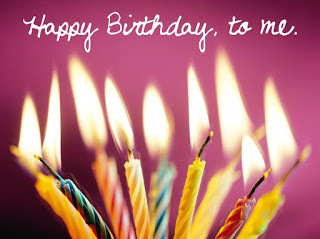 As I write in
Acts of Surrender: A Writer’s Memoir
, birthdays for me have always been more about the transformationally personal than about big crowds and noisy parties.
As I write in
Acts of Surrender: A Writer’s Memoir
, birthdays for me have always been more about the transformationally personal than about big crowds and noisy parties.Shortly before my 21st birthday, I came out as a gay man; shortly after, I moved into my first apartment. Just before my 30th, I lost my mother’s wedding band at Stonehenge – a symbolic break from her influence (I had been wearing it as a memento since her death six months earlier). On my 40th, having sold or given away most everything I owned, I moved to Nova Scotia. A few weeks before my 42nd birthday, I launched a new life in Sedona; four weeks after my 50th, that life abruptly ended.
Now, today, on my 61st, I once again leave the crowds behind in favor of a quiet birthday celebration…a shared birthday celebration. Shared with whom? With Sara’s Year , my 12th book and fourth novel, which launches officially today.
As I noted in last month’s issue, Sara’s Year emerged from a series of health scares that prompted me to ask what I wanted to be sure to accomplish if I were to die sooner rather than later. It’s not surprising, then, that a “death and rebirth” theme figures prominently in the story, even if it wasn't consciously planned. Given that, what better day to birth the book than my birthday?
Here’s another birthday parallel, one that makes today’s book launch even more apt: Just as we emerge into the world naked and vulnerable, we authors are similarly naked and vulnerable when we release the murmurings of our heart to the world. If each new book I write takes me deeper as a writer, then each new book also reveals more of that depth to you. That makes Sara’s Year my most “naked” book yet!
“Walk the earth naked, clothed only in your truth,” I write in Dialogues with the Divine: Encounters with My Wisest Self . How perfect, if somewhat scary, to be spending my birthday in my creative birthday suit!
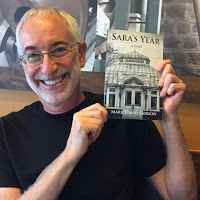 Help Me Celebrate with a Gift That’s as Much for You as for Me: Order
Sara’s Year
TODAY!
Help Me Celebrate with a Gift That’s as Much for You as for Me: Order
Sara’s Year
TODAY!
Why today (apart from the obvious)? Amazon and other book-site rankings are affected not only by the number of books ordered but by how close together those orders are. That means that a bunch of book orders over a single day or two has a more dramatic impact on rankings than the same number of orders spread over several weeks.
Here's where to find Sara online...• Amazon: Kindle/Paperback
• iBook store
• Sara’s Year is also available as an ebook in the Google Play, Kobo and Nook stores and as a signed paperback from my website
Published on October 03, 2015 02:33



